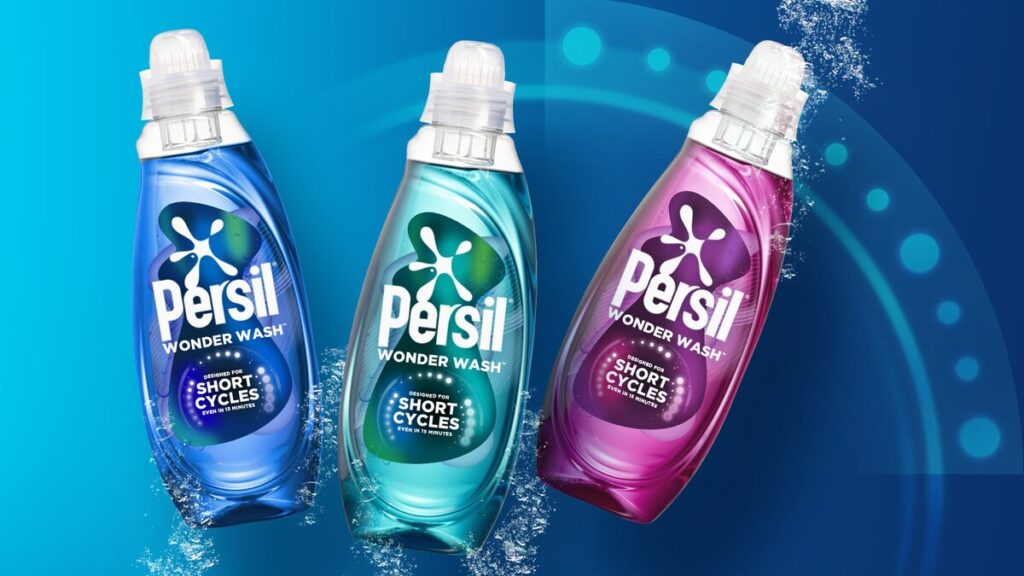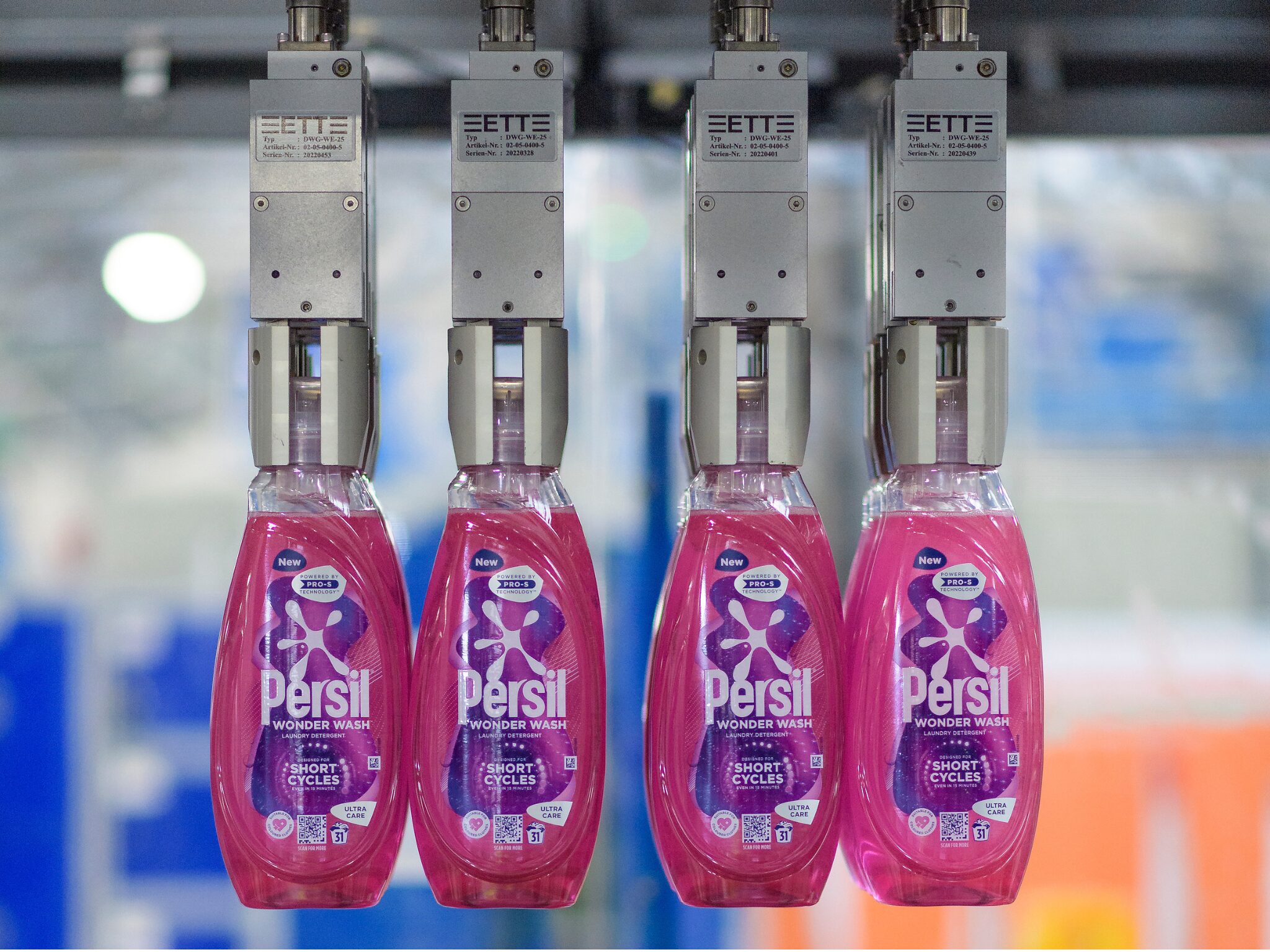Wonder Wash: Unilever’s AI-Driven Eco Laundry Detergent is Built for Short Cycles
5 Mins Read
Unilever has unveiled Wonder Wash, a new laundry detergent that is designed specifically to meet the growing trend of short washing cycles, and cuts emissions, water and energy use too.
A laundry detergent built for the time-strapped, sweat-laden, hybrid-working consumers that delivers energy and water savings and has a lower climate impact – that’s what Unilever is promising with Wonder Wash.
Part of its Dirt is Good brand – known as OMO, Persil, Surf Excel, Breeze, Rinso, Ala or Skip internationally – the new detergent leverages artificial intelligence and robotics to solve what the CPG giant calls a “new consumer need”.
It notes that changes in lifestyle have brought about a “seismic shift” in the laundry world – 70% of the clothing we wash now has no visible stains (but instead invisible sweat, dust and grime), while 78% of washing machine owners now choose a cycle lasting less than half an hour at least once a week. The rise of “malodour-retaining athleisurewear”, remote working patterns, and washing machines featuring cycles as short as 15 minutes, have also contributed to this shift.
So Unilever is swooping in to address this need, with the Wonder Wash line of products able to perform effectively in short, cold-water cycles. It suggests that an efficient short-cycle wash can save 30% of water and 60% of energy, and its new innovation can reduce emissions per wash by 20% compared to other Persil products.
“As part of Unilever Home Care’s Clean Future Strategy, not only is this about delivering an unmissably superior laundry experience, but reducing environmental impact by encouraging the use of shorter, energy-saving cycles,” said Eduardo Campanella, business group president of Unilever Home Care. “Using over a century in detergent development, we’ve overcome a real technical challenge to offer outstanding performance even in the shortest timeframe and the difficult washing conditions of the short cycle.”
Addressing consumer pain points through AI
Wonder Wash was developed at Unilever’s R&D centre in Port Sunlight, UK. “To make this formulation, we deconstructed and reconstructed how a laundry detergent is created,” a company spokesperson told Green Queen. Its scientists explored the types of grease and grime consumers are looking to get rid of in a quick wash.
The conglomerate says conventional liquid detergents aren’t designed for the short cycle, as they struggle to dissolve and rinse fully within the rapid timeframe, and certain ingredients need longer to activate. This can lead to sticky residues and lingering odours on clothing.
“Unilever scientists leveraged state-of-the-art robotics plus AI-accelerated digital testing to create a technology – Pro-S technology (Pro-Smell, Pro-Scent, Pro-Speed and Pro-Sense) – that makes ingredients activate instantly as soon as the short cycle begins to remove dirt and malodour,” the representative explained. “This makes this laundry detergent specifically designed for short and cold wash cycles.”
The Pro-S technology is at the heart of Wonder Wash, and is built to perform better than its competitors against what Unilever calls the four biggest pain points of short-cycle users: malodour removal, absence of residues, freshness and fabric care.
To tackle these challenges, its team developed a blend of fast-acting ingredients and enzymes (some of which have never been used in laundry before), which activate as soon as the cycle begins and fight grime and odour compounds in minutes. “Liquids was chosen as the format for Wonder Wash as it dissolves faster than powder,” the spokesperson said.
There’s also a better fragrance at the end due to the use of long-lasting scents. “The fragrance was expertly designed using a combination of compounds to create a desired olfactive character and was selected due to its performance in a short cycle,” they added.
Unilever provides update on carbon labelling

The representative explains that Wonder Wash “shares many ingredients with regular detergent but contains new technology. which helps to release malodour compounds from fabrics and deliver unmatched fragrance in short, cold wash cycles”. Highlighting the depth of innovation, the product has 35 patents pending, which – if you’ll believe the company – can create a new category of laundry products in a short-cycle category that’s set to grow by 21% annually and be worth €2B in two years.
The products are available in three variants – Speed Clean, Ultra Care and Odour Defy – costing between £7-10 (depending on the size), which is on par with conventional Persil products. It’s now available in the UK, Ireland and China, with a wider international rollout expected later this year, with France likely to be the next destination.
“Understanding consumer needs is key to our laundry innovation and until now, detergents have not kept pace with changing behaviours,” said Campanella. “By harnessing people’s enthusiasm for short cycles for everyday stains, we’re opening up the potential for a new category of short cycle products within laundry.”
He added: “This breakthrough in fast-acting cleaning will come to consumers around the world under Dirt Is Good, one of Unilever’s 30 Power Brands – where we’re really focusing our investment and bringing through bigger and better innovations,” he added. “We believe it’s going to be a truly transformative product for the category.”
Adding to the sustainability claims is the product’s transparent packaging, which is made up of 35% recycled material and is 100% recyclable. This results in lower plastic weight per bottle and more efficient transportation.
Speaking of sustainability, Unilever had committed to introducing carbon labelling for all 75,000 products globally by 2026. But this hasn’t really materialised yet. Asked about progress on this front, the company representative said: “In terms of carbon labelling, it is possible that some of our brands may wish to communicate product carbon footprints in the future, and for this having accurate data is essential. We also know information must be provided in context to be meaningful to consumers.”
They added that the company is “committed to improving transparency of GHG emissions” in its value chain: “We are focusing our efforts into programmes such as the Pathfinder for Carbon Transparency, hosted by the World Business Council for Sustainable Development, which is working to standardise industry measurement and reporting of product greenhouse gas footprint data. Our collection of more accurate data will help Unilever to make more informed procurement decisions as we work towards our climate targets.”



